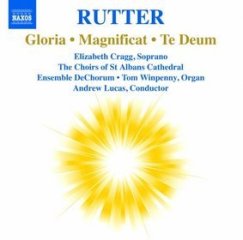John Rutter - Gloria • Magnificat • Te Deum (Lucas) [2011]
John Rutter - Gloria • Magnificat • Te Deum (Lucas) [2011]

Gloria 1. I. Allegro vivace 00:05:29 2. II. Andante 00:06:17 3. III. Vivace e ritmico 00:05:35 Magnificat 4. Magnificat anima mea 00:06:57 5. Of a Rose, a lovely Rose 00:05:26 6. Quia fecit mihi magna 00:06:23 7. Et misericordia 00:05:00 8. Fecit potentiam 00:03:38 9. Esurientes 00:06:39 10. Gloria Patri 00:05:22 11. Te Deum 00:07:54 Elizabeth Cragg - soprano The Choir of St Albans Cathedral Ensemble DeChorum Tom Winpenny - organ Andrew Lucas - conductor
Acclaimed British composer John Rutter’s Gloria was a milestone in his career and remains an evergreen favourite with choirs worldwide for its freshness, drama and sheer beauty. His joyous setting of the Magnificat was conceived, in the composer’s words, as ‘a bright Latin-flavoured fiesta’ and is performed here in its version for choir, organ and chamber orchestra. This delightful choral album concludes with Rutter’s setting of the Te Deum, one of the church’s most ebullient hymns of praise to the Almighty. ---naxos.com
John Rutter's Gloria is probably his most frequently recorded, large-scale piece. Written in 1974, it was his first major international commission and it remains one of his most popular works. He was given explicit instructions to make it accessible, "so that a non-specialist audience could enjoy the music on first hearing," and that approach has characterized the bulk of his output, resulting in a divided assessment of his work: popularity with many audiences, but dismissiveness from critics and many professional musicians. The 40-minute Magnificat (1990) and Te Deum (1988) inhabit much the same aesthetic sphere as the Gloria: lyrical, perkily melodious, and, depending on one's perspective, either skillfully or slickly constructed. This music is already well enough represented on disc that this album from Naxos featuring the choirs of St. Albans Cathedral and Ensemble DeChorum, led by Andrew Lucas, does not make an especially compelling entry to the field. The problem is the choral sound; the boys and girls of the choirs, constituting the soprano section, sometimes have a blanched, almost bleached sound that's especially unappealing when the section is singing by itself. The tenor section, too, is uneven, sometimes sounding thin and pinched. Soprano soloist Elizabeth Cragg is adequate, but her sound is somewhat small. The recorded sound tends to be distant and is not especially lively. --- Stephen Eddins, Rovi
download: uploaded yandex 4shared mediafire solidfiles mega zalivalka filecloudio anonfiles oboom ziddu
Zmieniony (Poniedziałek, 21 Kwiecień 2014 09:17)








